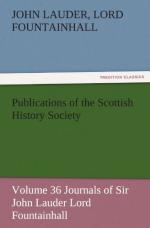[722] i.e. until.
[723] Mr. Andrew Ramsay, Minister of the old Kirk in Edinr., was Professor of Divinity and Rector of the University of Edinr. for six years successively preceeding the 8th March 1626, att which time he gave up both offices.—Note in MS.
[724] i.e. off, from.
[725] i.e. Plautus’s observation.
Abbotshall was a man of great force of character. He was much respected by Lauder, who, on his marriage with his daughter, was probably a good deal indebted to him for his first start in professional life. For example, it was no doubt by his influence that he was very early appointed one of the Assessors to the town of Edinburgh along with Sir George Lockhart and soon afterwards to the whole of the Burghs. To the facts of his life as narrated in the letter it may be added that in the course of his career he acquired extensive estates. Besides Abbotshall in Fife, he became the owner, among other lands, of Waughton in East Lothian, a place often mentioned by Lauder, where his brother-in-law, Sir Andrew Ramsay, junior, resided. The eulogy in the letter is somewhat deficient in light and shade, more so than some other passages in which Lauder mentions his father-in-law (see Introduction, p. xxxvi). A good deal about Abbotshall may be read in Sir George Mackenzie’s Memoirs, the following extract from which (p. 246) will help to supply the chiaroscuro.
’Sir Andrew Ramsay had, by obtaining 5000ll sterling to the Duke of Lauderdale for the Citadel of Leith, and other 5000ll to him for the new impositions granted to the town by the King upon ale and wine, insinuated himself very far into the favour of his Grace; and by his favour had, for ten successive years, continu’d himself Provost of Edinburgh, and consequently Preses of the Burghs; by which, and by having the first vote of Parliament, he was very serviceable to Lauderdale; who in requital of that favour obtained 200 ll sterling per annum settled upon the Provost of Edinburgh, and caused the king give him 4000ll sterling for his comprising of the Bass, a rock barren and useless. Thus they were kind to one another upon his Majesty’s expenses. In this office of Provost he had governed most tyrannically for ten years, applying the Coramon Good to himself and friends, and inventing new though unnecessary employments within the town, to oblige those who depended upon him. But at last the citizens, weary of his yoke, resolved to turn him out at Michaelmas 1672.’
The attempt failed at that time.




